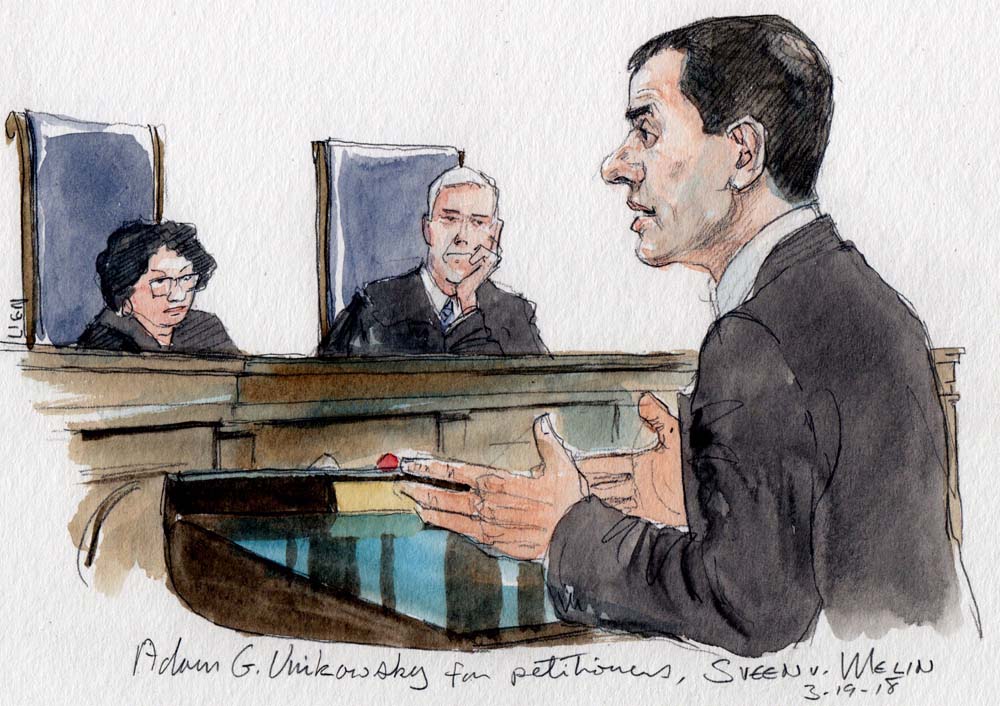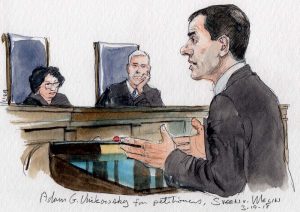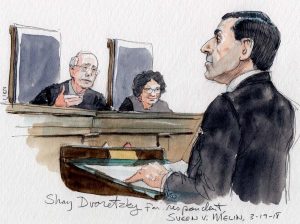Argument analysis: Legal questions, practical concerns at play in post-divorce life insurance case

on Mar 19, 2018 at 5:39 pm

When Mark Sveen died in 2011, his life insurance policy still named his ex-wife, Kaye Melin, as the beneficiary – even though the couple had divorced four years before. Nothing in the Minnesota couple’s divorce settlement (which divided up, among other things, the all-terrain-vehicle and the snowmobile) addressed the fate of Mark’s insurance policy, and there was no other evidence – other than a statement from Kaye herself – of what Mark wanted to do about the policy. Under a state law passed in 2002, which provides that a divorce automatically nullifies the designation of a former spouse as the beneficiary of a life-insurance policy, the proceeds from the policy would go to Mark’s adult children, Ashley and Antone. Kaye challenged the law, arguing that it violates the Constitution’s contracts clause, which bars the states from enacting laws “impairing the obligation of contracts.” After an hour of oral argument today at the Supreme Court, it was not clear how the justices are likely to rule, but concerns about the practical effect of their ruling could sway them toward a decision in favor of Mark’s children.

Adam G. Unikowsky for petitioners (Art Lien)
Arguing on behalf of Ashley and Antone Sveen, attorney Adam Unikowsky emphasized that the contracts clause was intended to protect the parties to a contract who had relied on the terms of their agreement. But the Minnesota law doesn’t come into play until a couple divorces, he stressed, and the insurance policyholder doesn’t have to do anything if he knows about the law, because the beneficiary is automatically changed. The law simply creates a default rule, Unikowsky told the justices, based on the assumption that someone who divorces will no longer want to have his former spouse remain his life-insurance beneficiary.
Not all of the justices accepted Unikowsky’s assertion that “the calculus changes” when a couple divorces, justifying the automatic revocation of a beneficiary designation. Justice Sonia Sotomayor asked Unikowsky to point her to the basis for the Minnesota legislature’s findings, while Justice Neil Gorsuch suggested that the identity of a beneficiary is important. Gorsuch quipped, “Does anyone pay life insurance for the joy of paying life insurance?”
Justice Ruth Bader Ginsburg also appeared dubious, telling Unikowsky that if the state wanted to make sure that life insurance went to the beneficiary whom the policy holder had intended, it could have used a less draconian method to do so. For example, she observed, other states have laws that require a judge to ask each divorcing couple whether they had life insurance and, if so, whether they wanted the beneficiaries to remain the same.
Unikowsky pushed back, telling Ginsburg that those states also have revocation-on-divorce laws like Minnesota’s and that they use the notification requirements as a “supplement.” The revocation-on-divorce laws, he added, also remove any ambiguity about whether a policyholder actually intended to revoke his beneficiary designation.
If the justices appeared skeptical during Unikowsky’s first 25 minutes at the lectern, they seemed to harbor doubts about Kaye Melin’s position as well. Justice Stephen Breyer is widely regarded as the justice most likely to ask long, complicated questions, and he did not disappoint today – to the amusement of his colleagues on the bench. Breyer described, in some detail, three cases from the 19th century in which the court ruled that laws passed by legislatures after a contract has gone into effect did not violate the contracts clause because the laws only required a party to the contract to provide a notice or file an affidavit. Drawing chuckles from Justice Clarence Thomas, who sits next to him on the bench, Breyer told Shay Dvoretzky, who represented Kaye Melin, that requiring the policy holder to send a letter to insurance company if he wants his former spouse to remain his beneficiary doesn’t, by comparison, seem to be “a big deal.”

Shay Dvoretzky for respondent (Art Lien)
Dvoretzky pushed back, telling Breyer that the Minnesota law is based on the assumption that a policyholder like Mark Sveen isn’t paying attention to his life insurance policy but would have changed it if he had thought about it. But if that’s the case, Dvoretzky continued, it would be unrealistic to expect him to send a letter to the insurance company if he did want to keep his ex-wife as his beneficiary.
Justice Elena Kagan was unconvinced. That might be true, she suggested, if Sveen and Melin had gotten divorced before Minnesota passed its revocation-on-divorce law, because someone who isn’t otherwise paying attention to these issues would be most likely to learn of them when the divorce occurs. But when, as here, the divorce happens after the law was passed, it’s less likely to be true.
And Justice Samuel Alito seemed to believe that it was Melin’s position, rather than the Sveens’, that would interfere with contracts. Alito explained that, under Minnesota law, a policyholder like Mark Sveen would know when he divorced that his ex-wife would not be the beneficiary of his insurance policy. “And you’re saying,” he complained to Dvoretzky, that it “doesn’t matter that the insured may have counted on this.”
Breyer returned to this issue a few minutes later, and it was clear that he (and, in all likelihood, some of his colleagues) saw it as a real problem for Melin. “A lot of people,” he observed, “probably were divorced between 2002” – when the law went into effect – and 2018. If Melin were to win, he queried, what would happen to all of those people whose lawyers had told them that they didn’t need to do anything, because state law would automatically revoke their designation of a now-former spouse as their beneficiary? Put another way, Breyer continued, are “all of those people who thought their children would get the money” now “just out of luck”?
Dvoretzky responded that they would be out of luck, unless they learn that they need to write a letter to their insurance company changing their beneficiaries. It was an inevitable and completely logical concession, but the justices’ concerns about the long-term effect of a ruling for Melin could in the end be the deciding factor pointing toward a ruling for the Sveen children. We’ll know one way or the other by the end of June.
This post was originally published at Howe on the Court.


